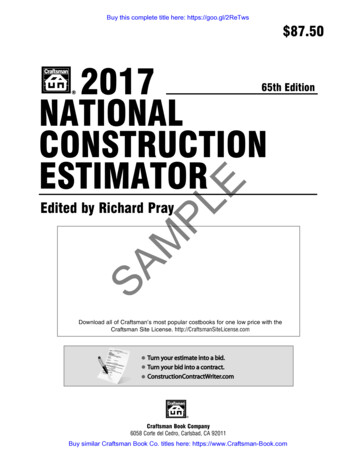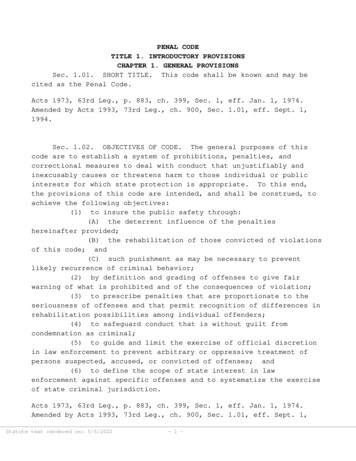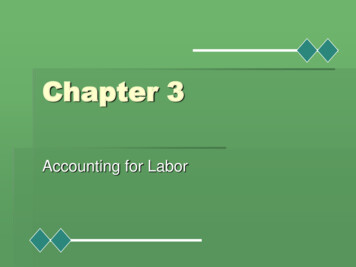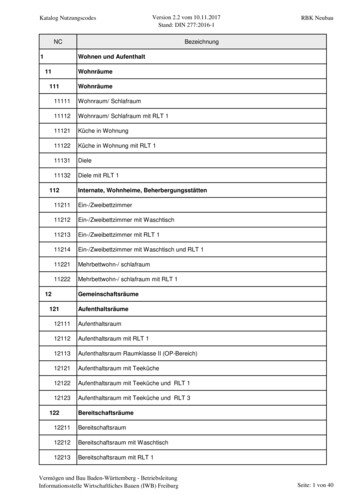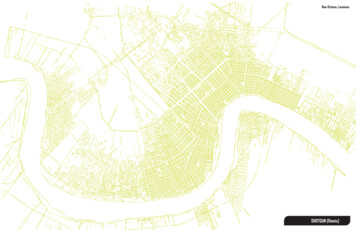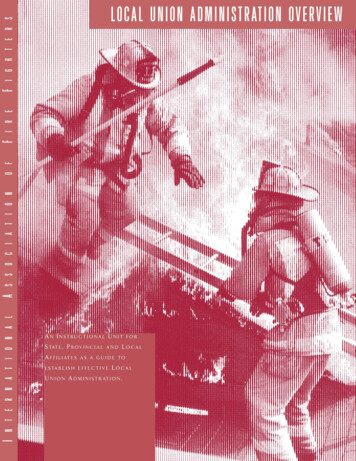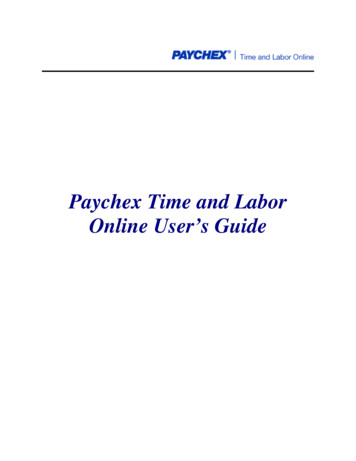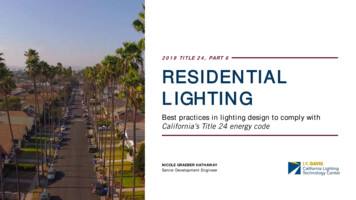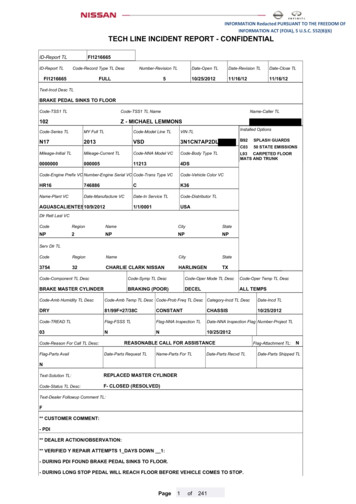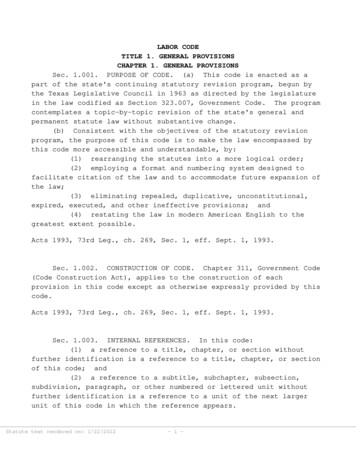
Transcription
LABOR CODETITLE 1. GENERAL PROVISIONSCHAPTER 1. GENERAL PROVISIONSSec. 1.001. PURPOSE OF CODE. (a) This code is enacted as apart of the state's continuing statutory revision program, begun bythe Texas Legislative Council in 1963 as directed by the legislaturein the law codified as Section 323.007, Government Code. The programcontemplates a topic-by-topic revision of the state's general andpermanent statute law without substantive change.(b) Consistent with the objectives of the statutory revisionprogram, the purpose of this code is to make the law encompassed bythis code more accessible and understandable, by:(1) rearranging the statutes into a more logical order;(2) employing a format and numbering system designed tofacilitate citation of the law and to accommodate future expansion ofthe law;(3) eliminating repealed, duplicative, unconstitutional,expired, executed, and other ineffective provisions; and(4) restating the law in modern American English to thegreatest extent possible.Acts 1993, 73rd Leg., ch. 269, Sec. 1, eff. Sept. 1, 1993.Sec. 1.002. CONSTRUCTION OF CODE. Chapter 311, Government Code(Code Construction Act), applies to the construction of eachprovision in this code except as otherwise expressly provided by thiscode.Acts 1993, 73rd Leg., ch. 269, Sec. 1, eff. Sept. 1, 1993.Sec. 1.003. INTERNAL REFERENCES. In this code:(1) a reference to a title, chapter, or section withoutfurther identification is a reference to a title, chapter, or sectionof this code; and(2) a reference to a subtitle, subchapter, subsection,subdivision, paragraph, or other numbered or lettered unit withoutfurther identification is a reference to a unit of the next largerunit of this code in which the reference appears.Statute text rendered on: 1/22/2022- 1 -
LABOR CODEActs 1993, 73rd Leg., ch. 269, Sec. 1, eff. Sept. 1, 1993.Sec. 1.004. REFERENCE IN LAW TO STATUTE REVISED BY CODE. Areference in a law to a statute or a part of a statute revised bythis code is considered to be a reference to the part of this codethat revises that statute or part of the statute.Acts 1993, 73rd Leg., ch. 269, Sec. 1, eff. Sept. 1, 1993.TITLE 2. PROTECTION OF LABORERSSUBTITLE A. EMPLOYMENT DISCRIMINATIONCHAPTER 21. EMPLOYMENT DISCRIMINATIONSUBCHAPTER A. GENERAL PROVISIONSSec. 21.001. PURPOSES. The general purposes of this chapterare to:(1) provide for the execution of the policies of Title VIIof the Civil Rights Act of 1964 and its subsequent amendments (42U.S.C. Section 2000e et seq.);(2) identify and create an authority that meets thecriteria under 42 U.S.C. Section 2000e-5(c) and 29 U.S.C. Section633;(3) provide for the execution of the policies embodied inTitle I of the Americans with Disabilities Act of 1990 and itssubsequent amendments (42 U.S.C. Section 12101 et seq.);(4) secure for persons in this state, including personswith disabilities, freedom from discrimination in certain employmenttransactions, in order to protect their personal dignity;(5) make available to the state the full productivecapacities of persons in this state;(6) avoid domestic strife and unrest in this state;(7) preserve the public safety, health, and generalwelfare; and(8) promote the interests, rights, and privileges ofpersons in this state.Acts 1993, 73rd Leg., ch. 269, Sec. 1, eff. Sept. 1, 1993. Amendedby Acts 1995, 74th Leg., ch. 76, Sec. 9.01(a), eff. Sept. 1, 1995.Statute text rendered on: 1/22/2022- 2 -
LABOR CODESec. 21.0015. TEXAS WORKFORCE COMMISSION. The powers andduties exercised by the Commission on Human Rights under this chapterare transferred to the Texas Workforce Commission. A reference inthis chapter to the "commission" means the Texas WorkforceCommission.Added by Acts 2003, 78th Leg., ch. 302, Sec. 1.Amended by:Acts 2015, 84th Leg., R.S., Ch. 1138 (S.B. 208), Sec. 9, eff.September 1, 2015.Sec. 21.002. DEFINITIONS. In this chapter:(1) "Auxiliary aids and services" includes:(A) qualified interpreters or other effective methodsof making aurally delivered materials available to individuals withhearing impairments;(B) qualified readers, taped texts, or other effectivemethods of making visually delivered materials available toindividuals with visual impairments;(C) acquisition or modification of equipment ordevices; and(D) services and actions similar to those described byParagraphs (A)-(C).(2) "Bona fide occupational qualification" means aqualification:(A) reasonably related to the satisfactory performanceof the duties of a job; and(B) for which a factual basis exists for the beliefthat no person of an excluded group would be able to satisfactorilyperform the duties of the job with safety or efficiency.(3) Repealed by Acts 2003, 78th Leg., ch. 302, Sec. 4(2).(4) "Complainant" means an individual who brings an actionor proceeding under this chapter.(5) "Demonstrates" means meets the burdens of productionand persuasion.(6) "Disability" means, with respect to an individual, amental or physical impairment that substantially limits at least onemajor life activity of that individual, a record of such animpairment, or being regarded as having such an impairment. The termStatute text rendered on: 1/22/2022- 3 -
LABOR CODEdoes not include:(A) a current condition of addiction to the use ofalcohol, a drug, an illegal substance, or a federally controlledsubstance; or(B) a currently communicable disease or infection asdefined in Section 81.003, Health and Safety Code, or required to bereported under Section 81.041, Health and Safety Code, thatconstitutes a direct threat to the health or safety of other personsor that makes the affected person unable to perform the duties of theperson's employment.(7) "Employee" means an individual employed by an employer,including an individual subject to the civil service laws of thisstate or a political subdivision of this state, except that the termdoes not include an individual elected to public office in this stateor a political subdivision of this state.(8) "Employer" means:(A) a person who is engaged in an industry affectingcommerce and who has 15 or more employees for each working day ineach of 20 or more calendar weeks in the current or precedingcalendar year;(B) an agent of a person described by Paragraph (A);(C) an individual elected to public office in thisstate or a political subdivision of this state; or(D) a county, municipality, state agency, or stateinstrumentality, regardless of the number of individuals employed.(9) "Employment agency" means a person or an agent of theperson who regularly undertakes, with or without compensation, toprocure:(A) employees for an employer; or(B) the opportunity for employees to work for anemployer.(10) "Labor organization" means a labor organizationengaged in an industry affecting commerce. The term includes:(A) an organization, an agency, or an employeerepresentation committee, group, association, or plan engaged in anindustry affecting commerce in which employees participate and thatexists for the purpose, in whole or in part, of dealing withemployers concerning grievances, labor disputes, wages, rates of pay,hours, or other terms or conditions of employment;(B) a conference, general committee, joint or systemStatute text rendered on: 1/22/2022- 4 -
LABOR CODEboard, or joint council that is subordinate to a national orinternational labor organization; and(C) an agent of a labor organization.(11) "Local commission" means a commission on humanrelations created by one or more political subdivisions.(11-a) "Major life activity" includes, but is not limitedto, caring for oneself, performing manual tasks, seeing, hearing,eating, sleeping, walking, standing, lifting, bending, speaking,breathing, learning, reading, concentrating, thinking, communicating,and working. The term also includes the operation of a major bodilyfunction, including, but not limited to, functions of the immunesystem, normal cell growth, and digestive, bowel, bladder,neurological, brain, respiratory, circulatory, endocrine, andreproductive functions.(12) "Political subdivision" means a county ormunicipality.(12-a) "Regarded as having such an impairment" meanssubjected to an action prohibited under Subchapter B or C because ofan actual or perceived physical or mental impairment, other than animpairment that is minor and is expected to last or actually lastsless than six months, regardless of whether the impairment limits oris perceived to limit a major life activity.(13) "Respondent" means the person charged in a complaintfiled under this chapter and may include an employer, employmentagency, labor organization, or joint labor-management committee thatcontrols an apprenticeship or other training or retraining program,including an on-the-job training program.(14) "State agency" means:(A) a board, commission, committee, council,department, institution, office, or agency in the executive branch ofstate government having statewide jurisdiction;(B) the supreme court, the court of criminal appeals, acourt of appeals, or the State Bar of Texas or another judicialagency having statewide jurisdiction; or(C) an institution of higher education as defined bySection 61.003, Education Code.Acts 1993, 73rd Leg., ch. 269, Sec. 1, eff. Sept. 1, 1993. Amendedby Acts 1995, 74th Leg., ch. 76, Sec. 9.02(a), eff. Sept. 1, 1995;Acts 1997, 75th Leg., ch. 834, Sec. 1, eff. Sept. 1, 1997; ActsStatute text rendered on: 1/22/2022- 5 -
LABOR CODE1999, 76th Leg., ch. 872, Sec. 10, eff. Sept. 1, 1999; Acts 2003,78th Leg., ch. 302, Sec. 4(a).Amended by:Acts 2009, 81st Leg., R.S., Ch. 337 (H.B. 978), Sec. 1, eff.September 1, 2009.Sec. 21.0021. CONSTRUCTION OF CERTAIN DEFINITIONS. (a) Theterm "disability":(1) shall be construed in favor of broad coverage ofindividuals under Subchapters B and C, to the maximum extent allowedunder those subchapters; and(2) includes an impairment that is episodic or in remissionthat substantially limits a major life activity when active.(b) The determination of whether an impairment substantiallylimits a major life activity must be made without regard to theameliorative effects of mitigating measures, including:(1) medication, medical supplies, medical equipment,medical appliances, prosthetic limbs and devices, hearing aids,cochlear implants and other implantable hearing devices, mobilitydevices, and oxygen therapy equipment;(2) devices that magnify, enhance, or otherwise augment avisual image, other than eyeglasses and contact lenses that areintended to fully correct visual acuity or eliminate refractiveerror;(3) the use of assistive technology;(4) reasonable accommodations and auxiliary aids orservices; and(5) learned behavioral or adaptive neurologicalmodifications.Added by Acts 2009, 81st Leg., R.S., Ch. 337 (H.B. 978), Sec. 2, eff.September 1, 2009.Sec. 21.0022. FRANCHISORS EXCLUDED. (a) In this section,"franchisee" and "franchisor" have the meanings assigned by 16 C.F.R.Section 436.1.(b) For purposes of this chapter, a franchisor is notconsidered to be an employer of:Statute text rendered on: 1/22/2022- 6 -
LABOR CODE(1) a franchisee; or(2) a franchisee's employees.(c) With respect to a specific claim for relief under thischapter made by a franchisee or a franchisee's employee, this sectiondoes not apply to a franchisor who has been found by a court ofcompetent jurisdiction in this state to have exercised a type ordegree of control over the franchisee or the franchisee's employeesnot customarily exercised by a franchisor for the purpose ofprotecting the franchisor's trademarks and brand.Added by Acts 2015, 84th Leg., R.S., Ch. 1156 (S.B. 652), Sec. 1,eff. September 1, 2015.Sec. 21.003. GENERAL POWERS AND DUTIES OF COMMISSION. (a) Thecommission may:(1) promote the creation of local commissions on humanrights by cooperating or contracting with individuals or state,local, or other agencies, public or private, including agencies ofthe federal government and of other states;(2) receive, investigate, seek to conciliate, and pass oncomplaints alleging violations of this chapter;(3) file civil actions to effectuate the purposes of thischapter;(4) request and, if necessary, compel by subpoena:(A) the attendance of necessary witnesses forexamination under oath; and(B) the production, for inspection and copying, ofrecords, documents, and other evidence relevant to the investigationof alleged violations of this chapter;(5) furnish technical assistance requested by a personsubject to this chapter to further compliance with this chapter orwith a rule or order issued under this chapter;(6) recommend in its annual report legislation or otheraction to carry out the purposes and policies of this chapter;(7) adopt procedural rules to carry out the purposes andpolicies of this chapter; and(8) provide educational and outreach activities toindividuals who have historically been victims of employmentdiscrimination.Statute text rendered on: 1/22/2022- 7 -
LABOR CODE(b) The commission by rule may authorize a commissioner or oneof its staff to exercise the powers stated in Subsection (a)(4) onbehalf of the commission.(c) The commission biennially shall develop an inventory ofequal employment opportunity policies and programs adopted andimplemented by the various state agencies.(d) The commission at least annually shall make a comprehensivewritten report on the commission's activities to the governor and tothe legislature.(e) The commission shall conduct a study of the policies andprograms of a selected state agency if the commission is directed toconduct the study by legislative resolution or by executive order ofthe governor.Acts 1993, 73rd Leg., ch. 269, Sec. 1, eff. Sept. 1, 1993. Amendedby Acts 1995, 74th Leg., ch. 76, Sec. 9.03(a), eff. Sept. 1, 1995;Acts 1999, 76th Leg., ch. 872, Sec. 11, eff. Sept. 1, 1999.Amended by:Acts 2013, 83rd Leg., R.S., Ch. 1312 (S.B. 59), Sec. 77, eff.September 1, 2013.Sec. 21.0035. CIVILIAN WORKFORCE COMPOSITION. (a) Thecommission by rule shall biennially determine:(1) the percentage of the statewide civilian workforcecomposed of:(A) Caucasian Americans;(B) African Americans;(C) Hispanic Americans;(D) females; and(E) males; and(2) the percentage of the statewide civilian workforce ofthe groups listed in Subdivision (1) according to the following jobcategories:(A) state agency administration;(B) professional;(C) technical;(D) protective services;(E) paraprofessional;(F) administrative support;Statute text rendered on: 1/22/2022- 8 -
LABOR CODE(G) skilled craft; and(H) service and maintenance.(b) The commission shall report the percentages of thestatewide civilian workforce as determined under this section to thegovernor and the legislature not later than the fifth day of eachregular session of the legislature.Added by Acts 1999, 76th Leg., ch. 872, Sec. 12, eff. Sept. 1, 1999.Sec. 21.004. CRIMINAL OFFENSE OF INTERFERENCE; PENALTY. (a)A person commits an offense if the person wilfully resists, prevents,impedes, or interferes with the performance of a duty under or theexercise of a power provided by this chapter.(b) An offense under this section is a Class B misdemeanor.Acts 1993, 73rd Leg., ch. 269, Sec. 1, eff. Sept. 1, 1993.Sec. 21.005. CONSTRUCTION WITH OTHER LAWS. (a) This chapterdoes not relieve a government agency or official of theresponsibility to ensure nondiscrimination in employment as requiredunder another provision of the state or federal constitutions orlaws.(b) This chapter does not affect the standards for determiningeligibility for benefits under Title 5 or under a state or federaldisability benefit program.(c) Nothing in this chapter may be construed as the basis for aclaim by an individual without a disability that the individual wassubject to discrimination because of the individual's lack of adisability.Acts 1993, 73rd Leg., ch. 269, Sec. 1, eff. Sept. 1, 1993.Amended by:Acts 2009, 81st Leg., R.S., Ch. 337 (H.B. 978), Sec. 3, eff.September 1, 2009.Sec. 21.006. CONFORMITY WITH FEDERAL STATUTES. If a provisionof this chapter is held by the Equal Employment OpportunityCommission to disqualify the commission as a deferral agency or forStatute text rendered on: 1/22/2022- 9 -
LABOR CODEthe receipt of federal funds, the commission shall administer thischapter to qualify for deferral status or the receipt of those fundsuntil the legislature meets in its next session and has anopportunity to amend this chapter.Acts 1993, 73rd Leg., ch. 269, Sec. 1, eff. Sept. 1, 1993.Sec. 21.007. PRIVILEGED COMMUNICATION; IMMUNITY. An oral orwritten statement made to a commissioner or an employee of thecommission in connection with the discharge of the commissioner's oremployee's duties under this chapter may not be the basis for anaction for defamation of character.Added by Acts 1995, 74th Leg., ch. 76, Sec. 9.08(a), eff. Sept. 1,1995.Sec. 21.008. LIMITED SEVERABILITY. (a) If any clause,sentence, subsection, section, or other provision of this chapter orthe application of such a provision to any person or circumstances isheld invalid or unconstitutional, that invalidity shall not affectthe other clauses, sentences, subsections, sections, or provisions orapplications of this chapter that may be given effect without theinvalid clause, sentence, subsection, section, or provision orapplication and shall not affect, invalidate, impair, or nullify theremainder of this chapter. The effect of the determination ofinvalidity shall be confined to the clause, sentence, subsection,section, or provision or application so adjudicated to be invalid orunconstitutional, and to that end the provisions of this chapter aredeclared to be severable.(b) If any limit on damages prescribed by Section 21.2585 isinvalidated by a method other than by legislative means, the amountof civil liability for all past and future noneconomic losses,including past and future pain and suffering, mental anguish andsuffering, and any other nonpecuniary damage, is limited to an amountnot to exceed 150,000.(c) If a limit on damages prescribed by Section 21.2585 isinvalidated by a method other than by legislative means and if thealternative civil liability limits contained in Subsection (b) arealso invalidated by a method other than by legislative means, SectionStatute text rendered on: 1/22/2022- 10 -
LABOR CODE21.2585 is void.Added by Acts 1995, 74th Leg., ch. 76, Sec. 9.08(a), eff. Sept. 1,1995.Sec. 21.009. JOINDER OF COMMISSION. (a) In any civil actionin which the validity of a provision of this chapter or Chapter 461,Government Code, a rule adopted under this chapter or Chapter 461,Government Code, or the application of the provision or rule ischallenged as void, unconstitutional, or unenforceable, thecommission shall be made a party to the proceedings, and, on themotion of the commission, venue of the cause may be transferred tothe district courts of Travis County.(b) An order restraining the commission or invalidating aprovision of this chapter or Chapter 461, Government Code, or acommission rule adopted under this chapter or Chapter 461, GovernmentCode, may not be enforced and may not take effect until thecommission has answered and appeared in the action and has exhaustedall avenues of appeal and any judgment is final and enforceable.(c) Notwithstanding any other provision of state law, includingthis chapter, only the commission, if a prevailing party, may recovercosts and attorney's fees in such a declaratory proceeding under thissection.Added by Acts 1995, 74th Leg., ch. 76, Sec. 9.08(a), eff. Sept. 1,1995.Sec. 21.010. EMPLOYMENT DISCRIMINATION TRAINING FOR STATEEMPLOYEES. (a) Each state agency shall provide to employees of theagency an employment discrimination training program that complieswith this section.(b) The training program must provide the employee withinformation regarding the agency's policies and procedures relatingto employment discrimination, including employment discriminationinvolving sexual harassment.(c) Each employee of a state agency shall attend the trainingprogram required by this section not later than the 30th day afterthe date the employee is hired by the agency and shall attendsupplemental training every two years.Statute text rendered on: 1/22/2022- 11 -
LABOR CODE(d) The commission shall develop materials for use by stateagencies in providing employment discrimination training as requiredby this section.(e) Each state agency shall require an employee of the agencywho attends a training program required by this section to sign astatement verifying the employee's attendance at the trainingprogram. The agency shall file the statement in the employee'spersonnel file.Added by Acts 1999, 76th Leg., ch. 872, Sec. 14, eff. Sept. 1, 1999.SUBCHAPTER B. UNLAWFUL EMPLOYMENT PRACTICESSec. 21.051. DISCRIMINATION BY EMPLOYER. An employer commitsan unlawful employment practice if because of race, color,disability, religion, sex, national origin, or age the employer:(1) fails or refuses to hire an individual, discharges anindividual, or discriminates in any other manner against anindividual in connection with compensation or the terms, conditions,or privileges of employment; or(2) limits, segregates, or classifies an employee orapplicant for employment in a manner that would deprive or tend todeprive an individual of any employment opportunity or adverselyaffect in any other manner the status of an employee.Acts 1993, 73rd Leg., ch. 269, Sec. 1, eff. Sept. 1, 1993.Sec. 21.052. DISCRIMINATION BY EMPLOYMENT AGENCY. Anemployment agency commits an unlawful employment practice if theemployment agency:(1) fails or refuses to refer for employment ordiscriminates in any other manner against an individual because ofrace, color, disability, religion, sex, national origin, or age; or(2) classifies or refers an individual for employment onthe basis of race, color, disability, religion, sex, national origin,or age.Acts 1993, 73rd Leg., ch. 269, Sec. 1, eff. Sept. 1, 1993.Statute text rendered on: 1/22/2022- 12 -
LABOR CODESec. 21.053. DISCRIMINATION BY LABOR ORGANIZATION. A labororganization commits an unlawful employment practice if because ofrace, color, disability, religion, sex, national origin, or age thelabor organization:(1) excludes or expels from membership or discriminates inany other manner against an individual; or(2) limits, segregates, or classifies a member or anapplicant for membership or classifies or fails or refuses to referfor employment an individual in a manner that would:(A) deprive or tend to deprive an individual of anyemployment opportunity;(B) limit an employment opportunity or adversely affectin any other manner the status of an employee or of an applicant foremployment; or(C) cause or attempt to cause an employer to violatethis subchapter.Acts 1993, 73rd Leg., ch. 269, Sec. 1, eff. Sept. 1, 1993.Sec. 21.054. ADMISSION OR PARTICIPATION IN TRAINING PROGRAM.(a) Unless a training or retraining opportunity or program isprovided under an affirmative action plan approved under a federallaw, rule, or order, an employer, labor organization, or joint labormanagement committee controlling an apprenticeship, on-the-jobtraining, or other training or retraining program commits an unlawfulemployment practice if the employer, labor organization, or committeediscriminates against an individual because of race, color,disability, religion, sex, national origin, or age in admission to orparticipation in the program.(b) Repealed by Acts 2019, 86th Leg., R.S., Ch. 257 (H.B. 1074), Sec. 2, eff. September 1, 2019.Acts 1993, 73rd Leg., ch. 269, Sec. 1, eff. Sept. 1, 1993.Amended by:Acts 2019, 86th Leg., R.S., Ch. 257 (H.B. 1074), Sec. 2, eff.September 1, 2019.Sec. 21.055. RETALIATION. An employer, labor union, oremployment agency commits an unlawful employment practice if theStatute text rendered on: 1/22/2022- 13 -
LABOR CODEemployer, labor union, or employment agency retaliates ordiscriminates against a person who, under this chapter:(1) opposes a discriminatory practice;(2) makes or files a charge;(3) files a complaint; or(4) testifies, assists, or participates in any manner in aninvestigation, proceeding, or hearing.Acts 1993, 73rd Leg., ch. 269, Sec. 1, eff. Sept. 1, 1993.Sec. 21.056. AIDING OR ABETTING DISCRIMINATION. An employer,labor union, or employment agency commits an unlawful employmentpractice if the employer, labor union, or employment agency aids,abets, incites, or coerces a person to engage in a discriminatorypractice.Acts 1993, 73rd Leg., ch. 269, Sec. 1, eff. Sept. 1, 1993.Sec. 21.057. INTERFERENCE WITH COMMISSION. An employer, laborunion, or employment agency commits an unlawful employment practiceif the employer, labor union, or employment agency wilfullyinterferes with the performance of a duty or the exercise of a powerunder this chapter or Chapter 461, Government Code, by thecommission, the commission's staff, or the commission'srepresentative.Acts 1993, 73rd Leg., ch. 269, Sec. 1, eff. Sept. 1, 1993.Sec. 21.058. PREVENTION OF COMPLIANCE. An employer, laborunion, or employment agency commits an unlawful employment practiceif the employer, labor union, or employment agency wilfully obstructsor prevents a person from complying with this chapter or a ruleadopted or order issued under this chapter.Acts 1993, 73rd Leg., ch. 269, Sec. 1, eff. Sept. 1, 1993.Sec. 21.059.DISCRIMINATORY NOTICE OR ADVERTISEMENT.Statute text rendered on: 1/22/2022- 14 -(a)An
LABOR CODEemployer, labor organization, employment agency, or joint labormanagement committee controlling an apprenticeship, on-the-jobtraining, or other training or retraining program commits an unlawfulemployment practice if the employer, labor organization, employmentagency, or committee prints or publishes or causes to be printed orpublished a notice or advertisement relating to employment that:(1) indicates a preference, limitation, specification, ordiscrimination based on race, color, disability, religion, sex,national origin, or age; and(2) concerns an employee's status, employment, or admissionto or membership or participation in a labor union or training orretraining program.(b) This section does not apply if disability, religion, sex,national origin, or age is a bona fide occupational qualification.Acts 1993, 73rd Leg., ch. 269, Sec. 1, eff. Sept. 1, 1993.Sec. 21.0595. DISCRIMINATORY LEAVE POLICY AFFECTING EMPLOYEE'SENTITLEMENT TO PERSONAL LEAVE TO CARE FOR SICK FOSTER CHILD. Anemployer commits an unlawful employment practice if:(1) the employer administers a leave policy under which anemployee is entitled to personal leave to care for or otherwiseassist the employee's sick child; and(2) the leave policy described by Subdivision (1) does nottreat in the same manner as an employee's biological or adopted minorchild any foster child of the employee who:(A) resides in the same household as the employee; and(B) is under the conservatorship of the Department ofFamily and Protective Services.Added by Acts 2017, 85th Leg., R.S., Ch. 113 (H.B. 88), Sec. 1, eff.September 1, 2017.Sec. 21.060. VIOLATION OF CONCILIATION AGREEMENT. A party to aconciliation agreement made under this chapter commits an unlawfulemployment practice if the party violates the terms of theconciliation agreement.Acts 1993, 73rd Leg., ch. 269, Sec. 1, eff. Sept. 1, 1993.Statute text rendered on: 1/22/2022- 15 -
LABOR CODESec. 21.061. INSUFFICIENT EVIDENCE OF UNLAWFUL PRACTICE. Inthe absence of other evidence of an unlawful employment practice,evidence of the employment of one person in place of another is notsufficient to establish an unlawful employment practice.Acts 1993, 73rd Leg., ch. 269, Sec. 1, eff. Sept. 1, 1993.SUBCHAPTER C. APPLICATION; EXCEPTIONSSec. 21.101. AGE DISCRIMINATION LIMITED TO INDIVIDUALS OFCERTAIN AGE. The provisions of this chapter referring todiscrimination because of age or on the basis of age apply only todiscrimination against an individual 40 years of age or older.Acts 1993, 73rd Leg., ch. 269, Sec. 1, eff. Sept. 1, 1993.Amended by:Acts 2019, 86th Leg., R.S., Ch. 257 (H.B. 1074), Sec. 1, eff.September 1, 2019.Sec. 21.102. BONA FIDE EMPLOYEE BENEFIT PLAN; PRODUCTIONMEASUREMENT SYSTEM. (a) Except as provided by Subsections (b) and(c), an employer does not commit an unlawful employment practice byapplying different standards of compensation or different terms,conditions, or privileges of employment under:(1) a bona fide seniority system, merit system, or anemployee benefit plan, such as a retirement, pension, or insuranceplan, that is not a subterfuge to evade this chapter; or(2) a system that measures earnings by quantity or qualityof production.(b) An employee benefit plan may not excuse a failure to hireon the basis of age. A seniority system or employee benefit plan maynot require or permit involuntary retirement on the basis of ageexcept as permitted by Section 21.103.(c) This section does not apply to standards of compensation orterms, conditions, or privileges of employment that arediscriminatory on the basis of race, color, disability, religion,sex, national origin, or age.Statute text rendered on: 1/22/2022- 16 -
LABOR CODEActs 1993, 73rd Leg., ch. 269, Sec. 1, eff. Sept. 1, 1993.Sec. 21.103. COMPULSORY RETIREMENT PERMITTED FOR CERTAINEMPLOYEES. This chapter does not prohibit the compulsory retirementof an employee who is:(1) at least 65 years of age;(2) employed in a bona fide executive or high policy-makingposition for the two years preceding retirement; and(3) entitled to an immediate, nonforfeitable annualretirement benefit from a pension, profit-sharing, savings, ordeferred compensation plan or a combination of plans of theemployee's employer that equals, in the aggregate, at least 27,000.Acts 1993, 73rd Leg., ch. 269, Sec. 1, eff. Sept. 1, 1993.Sec. 21.104. AGE REQUIREMENT FOR PEACE OFFICERS OR FIREFIGHTERS. An employer does not commit an unlawful employmentpractice by imposing a minimum or maximum age requirement for peaceofficers or fire fighters.Acts 1993, 73rd Leg., ch. 269, Sec. 1, eff.
Sec. 1.004. REFERENCE IN LAW TO STATUTE REVISED BY CODE. A reference in a law to a statute or a part of a statute revised by this code is considered to be a reference to the part of this code that revises that statute or part of the statute. Acts 1993, 73rd Leg., ch. 269, Sec. 1, eff. Sept. 1, 1993. TITLE 2. PROTECTION OF LABORERS
